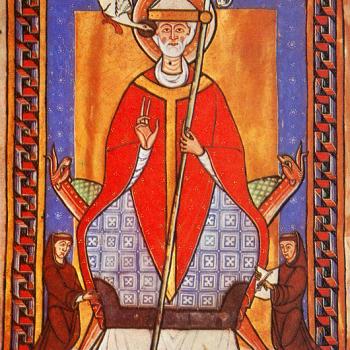Driving home from an evening out several weeks ago, a debate broke out in the backseat among my children of whether life existed on other planets. My son is interested in astronomy, so we have had this discussion several times. But this debate took an unexpected theological turn when speculation arose that if life existed on other planets would these extraterrestrial creatures have developed “religions”: would they know God? Would God have communicated to them?
We moderns, drenched in sci-fi books and movies, might think that such inquiries could only happen after the Scientific Revolution if not in more recent times. This is not the case. It was a lively topic in the Middle Ages, often referred to as a debate on the plurality of worlds. (“Worlds” here was understood more as a theoretical possibility than life-bearing exo-planets as we might think today.)
In the twelfth century, Albertus Magnus (the teacher of Thomas Aquinas) wrote “that since one of the most wondrous and noble questions of Nature is whether there is one world or many . . . it seems desirable for us to inquire about it.”
And scholastic thinkers did—with gusto. Some believed that other worlds existed, some did not, and the matter of God’s relations to these possible worlds was part of the discussion.
A pivotal moment in the debate came March 7, 1277. On this day, at the request of Pope John XXI, the bishop of Paris, Etienne Tempier, condemned 219 propositions that right-thinking theologians should not embrace on pain of excommunication. You might think that the Church condemned the possibility of other worlds–and you would be wrong. Article 34 of the Condemnation in fact held that it is a grave offense to hold “that the first cause [i.e. God] could not make several worlds” (my emphasis).
In history, context is always important. What especially irked the Church at the time was the high regard that many theologians had for (pagan) Aristotle, many of whose works had been recently recovered and translated into Latin via Arabic sources. Aristotle believed in the eternity of the world, that the world had simply always existed—a view that contradicted the longstanding Christian belief in God’s creation of the world ex nihlo, as Genesis seemed to convey. Implied in Aristotle’s cosmology, however, was the view that since a presumably single world had simply always existed, God, even had he wished, could not create other worlds. But in the Church’s view, this placed untenable constraints on God’s power, which in principle was unlimited and far above human understanding.
This view—and the theological logic behind it—still holds, I would argue. And we are free to speculate on life beyond earth and God’s possible relation to it.
I brought up this incident to my children, by the way, but apparently dragging the history of theology into the discussion did not sit terribly well with them. We finished the drive in ponderous silence, looking up at the starry sky before entering our home.













